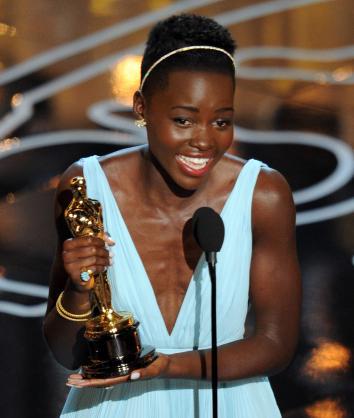Ellen Degeneres’ opening monologue at this year’s Oscar ceremony hummed along for most of its length in the tone of mildly passive-aggressive but fundamentally affectionate showbiz-ribbing she’s been perfecting for over a decade on her talk show. Then, just before the commercial break, the bit ended abruptly on a joke that stood out starkly for being, in the immortal words of Liz Phair, “obnoxious, funny, true and mean.” The night, Degeneres predicted, could only end in one of two ways: “Possibility No. 1: 12 Years a Slave wins. Possibility No. 2: You’re all racists.” There was a startled pause, then a big laugh (or maybe that was just my own guffaw ringing in my ears?).
Possibility No. 1 turned out to be the case last night (which in no way excludes the possibility that No. 2 might be too). In light of 12 Years a Slave’s multiple victories, Degeneres’ jab seems like a welcome but ultimately unnecessary attempt to defuse the tension that had come, in the last stages of the campaign, to surround this Oscar season’s final faceoff. The Best Picture race in particular was framed, sometimes explicitly, in moral terms: American Hustle vs. American history, Gravity vs. gravitas. An unpleasantly scolding example of this tone was the 12 Years Oscar-campaign slogan, “It’s time,” which struck me as implicitly suggesting the movie didn’t deserve to be awarded on its own merits. But 12 Years a Slave didn’t come out of the evening seeming like the film had won anything just because, solemnly and starchily, it was “time.” Its victory felt bigger—because less symbolic—than that.
It was a highly predictable ceremony overall, the biggest shock of the night being how radically John Travolta managed to transform the name of Idina Menzel into another entire name in his introduction of her Best Song performance. (God bless Adele Dazeem! That lady can sing.) But the mere fact that an unsurprising Oscar outcome could contain not only this much diversity, but also this much valuation of serious, difficult work was heartening. And 12 Years’ wins for Best Picture, Best Adapted Screenplay, and Best Supporting Actress were all thrilling moments, despite my resistance to some elements of that film. It’s a much more important and substantial work than Gravity, and the screenwriter John Ridley did a stupendous job adapting the archaic language of Northup’s memoir into a contemporary-feeling drama. And not to get too gushy here, but Lupita Nyong’o is, as of last night, officially some sort of radiant being from another dimension. Nyong’o’s movie-star wattage was so intense that Jennifer Lawrence herself almost seemed to pale in the glare. (This backstage photo of them play-wrestling over Nyong’o’s Oscar dramatizes the “it girl” faceoff that their personae were symbolically playing out.) Nyong’o’s acceptance speech was as simple and heartfelt as it was perfectly judged, beginning with a concise but devastating acknowledgement of the real historical person she played, and by implication, of history itself: “It doesn’t escape me for one moment that so much joy in my life is thanks to so much pain in someone else’s. And so I want to salute the spirit of Patsey for her guidance.”
Matthew McConaughey might have thought to scribble some notes during Nyong’o’s speech for his own monologue upon winning Best Actor. That was one stuffed-full suitcase of a speech, its contents including but not limited to: 1) an extensive encomium to God (a benevolent, McConaughey-friendly deity who seems to be the exact inverse of the indifferent void that surrounds his character in True Detective); 2) a quote (about God) from classic-Hollywood character actor and director Charles (“Charlie”?) Laughton; 3) an imitation of the actor’s late father in heaven, dancing in his underwear with “a cold can of Miller Lite,” some gumbo, and a lemon meringue pie; 4) a callback to a beloved fan quote from the early McConaughey vehicle Dazed and Confused; and 5) an extended story about the actor’s youthful resolution to have as his hero … his own 10-years-in-the-future self. I salute McConaughey’s eclecticism and begrudge him neither his faith, his verbosity, nor even his self-love (who wouldn’t love being McConaughey? And would we love him so much if he didn’t love himself?). But hold up—in that whole complicated bag of rhetorical tricks, nary a shoutout to Ron Woodroof, the AIDS patient and eventual activist he played in Dallas Buyers Club? Nor a word for the countless others, gay, straight, and transgender, who’ve been lost and continue to be lost to that terrible epidemic? And he’s accepting this highly visible prize for a movie that specifically and repeatedly thematizes the struggle of Reagan-era AIDS patients to get an indifferent straight establishment to recognize their existence? Matthew, I know your mama raised you better than that.
Read all of Slate’s coverage of the 2014 Academy Awards.
